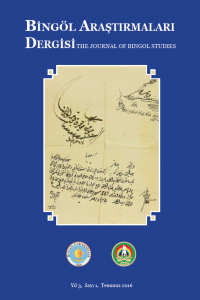Öz
Edebiyat ve mekân ilişkisi ontolojik bir boyut taşımaktadır. Bu ilişkiyi, mekânın farklı boyutlarda ele alınmasına imkân tanıyan edebi türlerde gözlemlemek mümkündür. Bu açıdan edebi eserde önem teşkil eden mekânı, farklı okumalara tabi tutabiliriz. Aydın Afacan’ın Metruk Şehir şiirine bakıldığında, Bingöl’ün Genç/Darayênî ilçesinin özdeşlik ilişkisi içerisinde şiirsel özne konumuna taşındığı görülür. Darayênî’ye atfedilmiş bir şiir ile karşılaşan okuyucu, devamında buruk bir atmosfer içine çekilir. Şiirin evrenine girildikçe yitik bir kentin, bir iç dökümü içinde resmedildiği görülür. Sözden önce yaşantının, yaşantıdan sonra halleşmenin geldiği düşüncesi hissedilir. Yüzey yapıda mekânsal yitiş ve olumsuz içermelerin sıralandığı eserde, bir değer olarak yüceltilen mekân derin yapıyı oluşturur. Böylece Afacan’ın Metruk Şehir’i, mekânsal poetika bağlamında yeniden varlık düzlemine çıkar. Bu çalışma, ihtiva ettiği göndermeler açısından Metruk Şehir şiirini mekân merkezli bir okumayla ele almakta, ayrıca coğrafya merkezli okuma ve mekân poetikası bağlamında söz konusu etmektedir.
Anahtar Kelimeler
Aydın Afacan Metruk Şehir şiir-mekân ilişkisi mekân poetikası
Kaynakça
- Afacan, A. (2001). Yan Yana Yedi Kırmızı, İstanbul: Can Yayınları. Bachelard, G. (1996). Mekânın Poetikası (Çev. Aykut Derman), İstanbul: Kesit Yayıncılık. Ercan, E., http://ekitap.kulturturizm.gov.tr/Eklenti/44364,turkiyeedebiyatharitasipdf.pdf?0 Erişim tarihi: 06.03.2017. Esgün, A. (2008). “Aydın Afacan’la Söyleşi” Deliler Teknesi, S.12. Garan, B. (2012). “Coğrafya Merkezli Okuma Işığında Kadından Kentler” Hacettepe Üniversitesi Türkiyat Araştırmaları Dergisi, 2012 Bahar (16), 87-111. Kefeli, E. (2009). “Coğrafya Merkezli Okuma” Turkish Studies International Periodical For the Languages, Literature and History of Turkish or Turkic, Volume 4 /1-I Winter 2009.
- Moran, B. (2012), Edebiyat Kuramları ve Eleştiri (22. bs.), İstanbul: İletişim Yayınları. Narlı, M. (2014). Şiir ve Mekân (2. bs.), Ankara: Akçağ Yayınları. Peker, H. (2008). “Büyülü Bahçenin Ozanı: Aydın Afacan” Deliler Teknesi, S.12. Şişmanoğlu, Ş. (2003). “Behçet Necatigil ve Şiirin Ev Hali” Bilkent Üniversitesi Ekonomi ve Sosyal Bilimler Enstitüsü, Yayımlanmamış Yüksek Lisans Tezi.
- Yener, A. G., http://www.edebistan.com/index.php/aligalipyener/mekanin-poetikasi-baglaminda-yazar-ve-evi/2012/06/ Erişim tarihi: 20.02.2017.
- -----------------, http://www.karabatakdergisi.com/poetika/sarlern-mekanla-lskler-uzerne-notlar 20.02.2017.
- Yılmaz, E. (2008). “Aydın Afacan: Zâtına Hoşça Bakan Narkissos” Deliler Teknesi, S.12.
Öz
The relation between literature and space/place has an ontological asbest. It is possible to observe this relation in literary genres that allow us to examine space in different dimensions. In this context, space, an important element in literary works, can be subject to different readings. In Aydın Afacan’s poem Metruk Şehir (the Dilapidated City), we see that the district of Genç/Darayeni in Bingöl is transferred to poetical subject position in the relation of identity. The reader meets a poem attributed to the district of Darayeni and is pulled into a gloomy atmosphere. As we move deeper into the universe of the poem, we see that a lost city is described in guise of a confession. The idea that word is preceded by experience and state is followed by experience embodies in the reader’s mind. In the work, spatial loss and negative involvements are told in the surface structure and space, which is exalted as a value, constitutes the deep structure. Thus, Afacan’s poem Metruk Şehir reappears in the existencelevel within the context of spatial poetics. The present study examines the poem Metruk Şehir through space-centered reading in terms of the references it contains and mentions the poem within the context of geography-centered reading and spatial poetics.
Anahtar Kelimeler
Aydın Afacan Metruk Şehir the poem-space relation poetics of space
Kaynakça
- Afacan, A. (2001). Yan Yana Yedi Kırmızı, İstanbul: Can Yayınları. Bachelard, G. (1996). Mekânın Poetikası (Çev. Aykut Derman), İstanbul: Kesit Yayıncılık. Ercan, E., http://ekitap.kulturturizm.gov.tr/Eklenti/44364,turkiyeedebiyatharitasipdf.pdf?0 Erişim tarihi: 06.03.2017. Esgün, A. (2008). “Aydın Afacan’la Söyleşi” Deliler Teknesi, S.12. Garan, B. (2012). “Coğrafya Merkezli Okuma Işığında Kadından Kentler” Hacettepe Üniversitesi Türkiyat Araştırmaları Dergisi, 2012 Bahar (16), 87-111. Kefeli, E. (2009). “Coğrafya Merkezli Okuma” Turkish Studies International Periodical For the Languages, Literature and History of Turkish or Turkic, Volume 4 /1-I Winter 2009.
- Moran, B. (2012), Edebiyat Kuramları ve Eleştiri (22. bs.), İstanbul: İletişim Yayınları. Narlı, M. (2014). Şiir ve Mekân (2. bs.), Ankara: Akçağ Yayınları. Peker, H. (2008). “Büyülü Bahçenin Ozanı: Aydın Afacan” Deliler Teknesi, S.12. Şişmanoğlu, Ş. (2003). “Behçet Necatigil ve Şiirin Ev Hali” Bilkent Üniversitesi Ekonomi ve Sosyal Bilimler Enstitüsü, Yayımlanmamış Yüksek Lisans Tezi.
- Yener, A. G., http://www.edebistan.com/index.php/aligalipyener/mekanin-poetikasi-baglaminda-yazar-ve-evi/2012/06/ Erişim tarihi: 20.02.2017.
- -----------------, http://www.karabatakdergisi.com/poetika/sarlern-mekanla-lskler-uzerne-notlar 20.02.2017.
- Yılmaz, E. (2008). “Aydın Afacan: Zâtına Hoşça Bakan Narkissos” Deliler Teknesi, S.12.
Ayrıntılar
| Birincil Dil | Türkçe |
|---|---|
| Bölüm | Makaleler |
| Yazarlar | |
| Yayımlanma Tarihi | 10 Temmuz 2016 |
| Gönderilme Tarihi | 10 Haziran 2016 |
| Yayımlandığı Sayı | Yıl 2016 Cilt: 3 Sayı: 1 |


